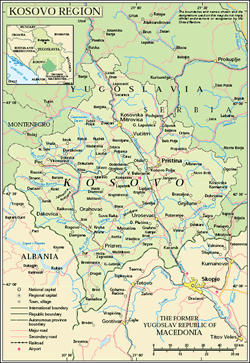Back to focus index
CIAO Focus, Sept 2007:
Kosovo and the Road to Independence
It has been eight years since NATO bombing raids ejected Serbian forces from Kosovo, but independence for this small country, currently administered by the United Nations, remains elusive.
In February 2007, U.N. diplomat Martti Ahtisaari sponsored a resolution for Kosovo’s de facto independence under European Union supervision. Serbia immediately rejected it while Russia, Serbia’s traditional ally, promised to use its veto power on the Security Council to block any attempt to turn Kosovo into a breakaway state. Serbia has said it will only agree to Kosovo’s autonomy under Serbian jurisdiction rather than full sovereignty.
Strong American and EU support for the Ahtisaari plan has ratcheted up the tension between the western powers and Russia, which says it will continue to reject any resolution that is unacceptable to Serbia.
The U.S., the E.U. and Russia are presently trying to mediate a solution to the problem and have set a deadline date of December 10, after which time Kosovo has threatened to declare independence unilaterally even if an agreement hasn’t been reached.
This month CIAO examines Kosovo and the road to independence.
From the CIAO Database:
Breaking the Kosovo Stalemate: Europe's Responsibility
Kosovo: No Good Alternatives to the Ahtisaari Plan
Outside Sources:*
Serbia and Montenegro: Kosovo (UNHCR)
http://www.unhcr.org/cgi-bin/texis/vtx/balkans-country?country=kosovo
The Ethnic Cleansing of Kosovo (US Dept. of State)
http://www.state.gov/www/regions/eur/rpt_990604_ksvo_ethnic.html
NATO's role in relation to the conflict in Kosovo (NATO)
http://www.nato.int/kosovo/history.htm#B
NATO Strikes (BBC)
http://news.bbc.co.uk/1/hi/special_report/1998/kosovo2/271265.stm
* Outside links are not maintained. For broken outside links, CIAO recommends the Way Back Machine.
